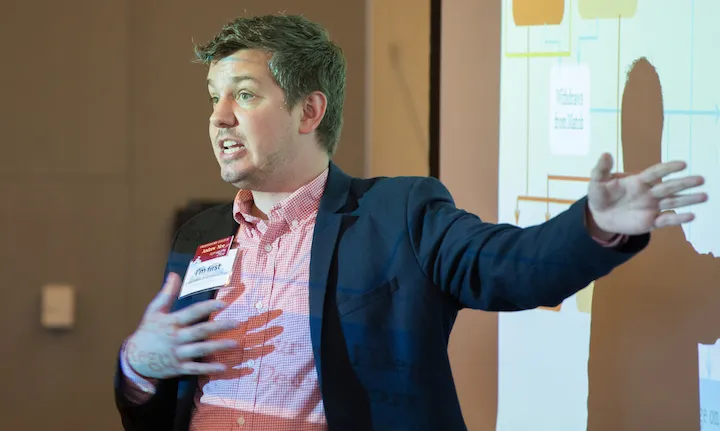Promoting Accessibility

Associate Dean of Admissions Andrew Moe presents at the inaugural College Access Summit in June.
Andrew Moe, associate dean of admissions and director of access at Swarthmore College, served as the co-director of the College's first College Access Summit in June.
Where does a high school senior whose parents didn’t go to college turn to understand the application process? What resources are available to a student from a remote rural area if she wants to apply to college? These questions and hundreds more like it are the ones I think about every day.
While the number of affluent students graduating from college has grown over the years, the figure has been disturbingly stagnant for low-income students despite billions of dollars and thousands of national and local programs.
For instance, while there’s been a 38-percentage point increase in the number of college graduates for high-income students since 1970, there’s been only a three-percentage point increase for low-income students in that same timeframe.[1] Just nine percent of young adults from the bottom quartile of family incomes obtain a bachelor’s degree by the age of 24.
At Swarthmore, our Quaker heritage informs our work, and that means we work extremely hard to make the college admissions process as fair, accessible, and understandable as possible. So in June, we gathered approximately 70 high school guidance counselors, community-based organizers, and college admissions officers with one goal in mind: how to support underserved students on the path to and through college. At Swarthmore we’ve been diligent about ensuring success for all of our students. As a result, those receiving the Pell Grant graduate at the same rate (87 percent) as our non-Pell Grant recipients, whereas according to a recent study, only 51 percent of Pell recipients enrolled in four-year nonprofit institutions nationwide graduate college. These issues are larger than my institution.
At the College Access Summit that we hosted, 10 colleges worked side-by-side with us to support guidance counselors and community-based organizers. We asked them to collaborate and develop presentations on areas of the greatest interest to them, and the students they hope to support and recruit. The result was nine compelling sessions that included topics such as the “good, the bad and the ugly” in financial aid award letters. The central discussion point in this session was how incredibly difficult these letters are for students to interpret and therefore, act on. I have a doctorate in higher education and have worked in this field for a better part of a decade, and they even stump me.
Other sessions covered topics like the unique challenges that first generation college students face, to helping prepare students for transferring to four-year institutions to the power of the college essay.
We felt this College Access Summit was so important that we not only hosted the event, we also provided transportation, food and lodging costs for high school counselors and community-based organization leaders. Often, counselors and advisors from under-resourced schools and organizations cannot afford to attend professional conferences, so the funding provided by Swarthmore allowed professionals to access these conversations and resources.
There’s a very long way to go, but gatherings like these will only serve to bring deserving students to colleges across the country. And with today’s climate, the chance for bright and determined students to get a college education only gets harder. Let’s all do our part to make sure the next generation graduates and thrives.
A version of this op-ed appeared in The Hechinger Report on August 22.
Learn more about Swarthmore's holistic approach to increasing access to underserved students, which includes admitting students without regard to their families' ability to pay and meeting their demonstrated need without requiring loans.
Learn more about Swarthmore’s commitment to access and inclusion at lifechanging.swarthmore.edu.
[1]Cahalan, M., & Perna, L. W. (2015). Indicators of higher education equity in the United States: 45 year trend report. The Pell Institute for the Study of Opportunity in Higher Education and PennAhead: Alliance for Higher Education and Democracy.



